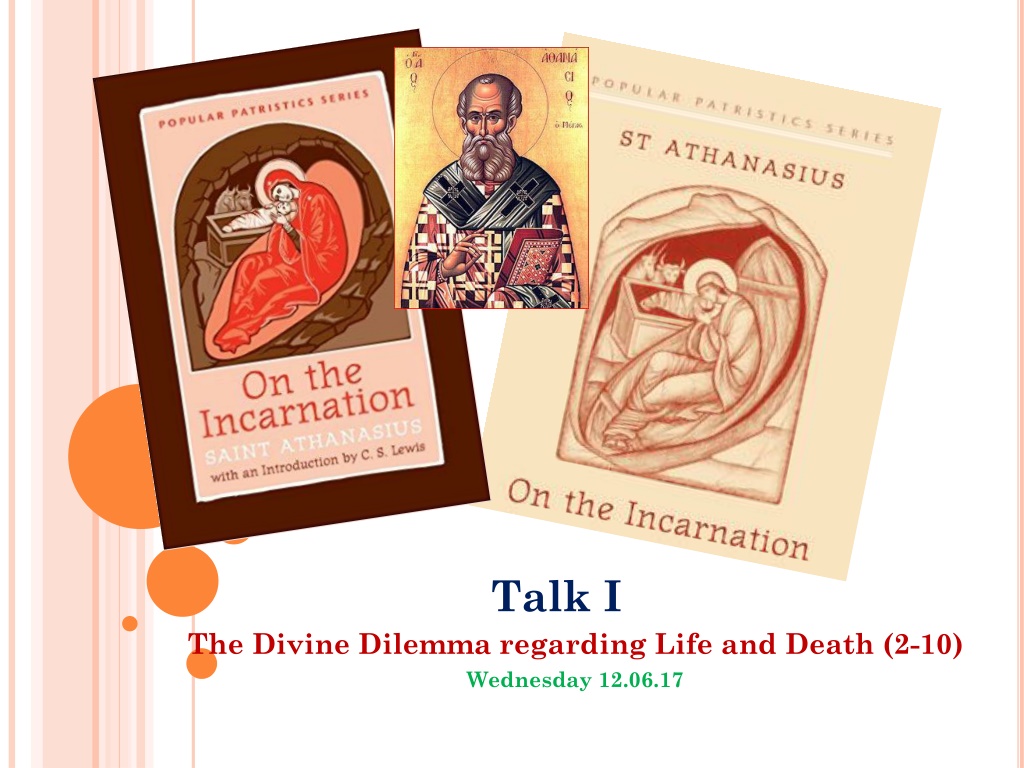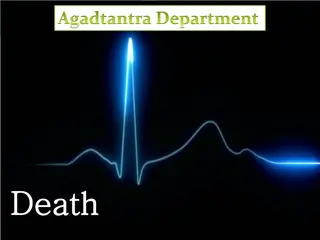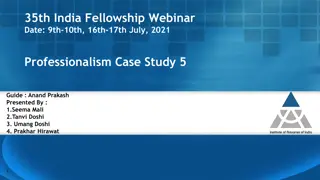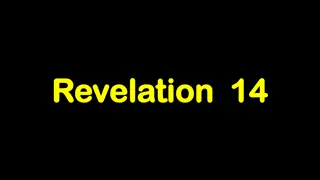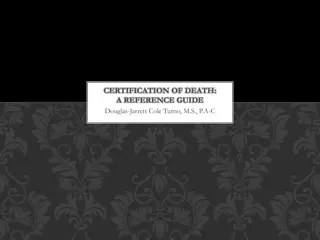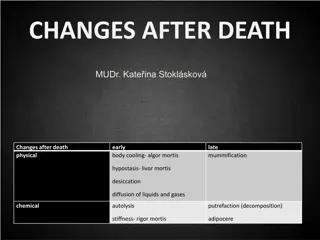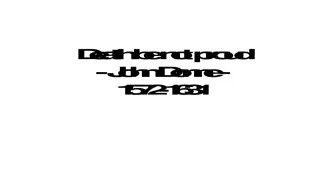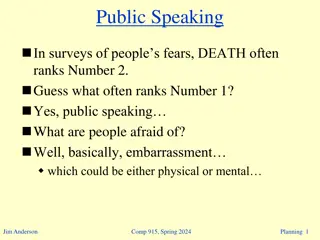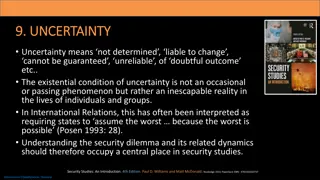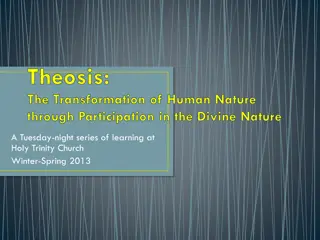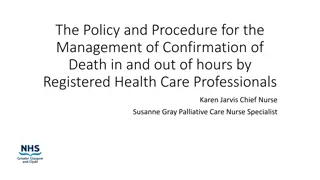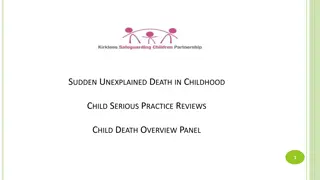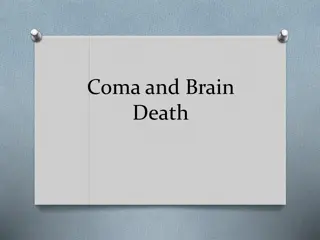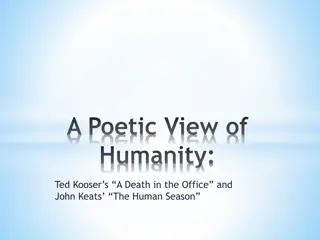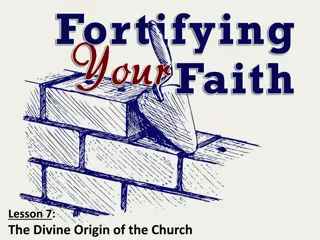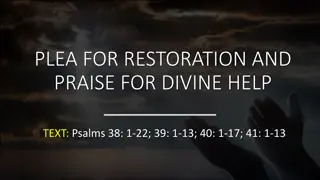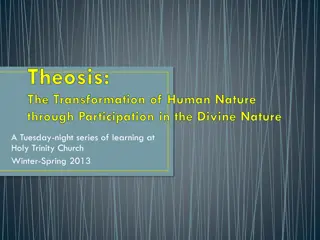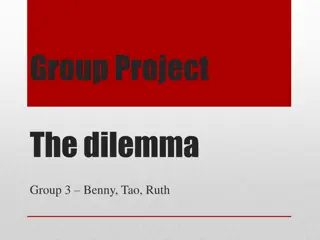Unraveling the Divine Dilemma of Life and Death in Talk I
Delve into the complexities of life and death as discussed in Talk I, exploring ancient wisdom and modern perspectives. C.S. Lewis provides insightful reflections on the value of traditional texts, urging readers to embrace firsthand knowledge. St. Athansius's remarkable life and contributions are highlighted, leading to a profound analysis of "On the Incarnation" and its historical significance.
Uploaded on Sep 29, 2024 | 0 Views
Download Presentation

Please find below an Image/Link to download the presentation.
The content on the website is provided AS IS for your information and personal use only. It may not be sold, licensed, or shared on other websites without obtaining consent from the author. Download presentation by click this link. If you encounter any issues during the download, it is possible that the publisher has removed the file from their server.
E N D
Presentation Transcript
Talk I The Divine Dilemma regarding Life and Death (2-10) Wednesday 12.06.17
POINTS TO BE COVERED I. Introduction II. Ch. 1,2 III.Ch. 3 IV.Ch. 4-10 V. How we pray it. VI. How we live it.
C S LEWIS : INTRODUCTION There is a strange idea abroad that in every subject the ancient books should be read only by the professionals, and that the amateur should content himself with the modern books. Thus I have found as a tutor in English Literature that if the average student wants to find out something about Platonism, the very last thing he thinks of doing is to take a translation of Plato off the library shelf and read the Symposium. He would rather read some dreary modern book ten times as long, all about "isms" and influences and only once in twelve pages telling him what Plato actually said. The error is rather an amiable one, for it springs from humility.
The student is half afraid to meet one of the great philosophers face to inadequate and thinks he will not understand him. But if he only knew, the great man, just because of his greatness, intelligible than his modern commentator. The simplest student will be able to understand, if not all, yet a very great deal of what Plato said; but hardly anyone can understand some modern books on Platonism. It has always therefore been one of my main endeavours as a teacher to persuade the young that firsthand knowledge is not only more worth acquiring than secondhand knowledge, but is usually much easier and more delightful This mistaken preference for the modern books and this shyness of the old ones is nowhere more rampant than in theology. face. He feels himself is much more to acquire.
ST ATHANSIUS (C. 296-373 AD) Born around 296 Attended the Council of Nicaea in325 Became the 20thpope in 326 He was exiled 4 times during his papacy He stayed in the throne of St. Mark 47 yrs From his Consecration (326) to his First Exile (336). From his First Exile (336) to his Second (340) From his Second Exile (340) to his Second Return (346). From his Second Return (346) to his Third Exile (356). From his Third to his Fourth Exile (356 362). His 39thPaschal message on 367 he stated the New Testament books From his Fourth Exile to his Death (362 373).
THE BOOK: ON THE INCARNATION 1) It is part II from his book Adversus Genetes Libri Dou Against the heathen 2) Written either before 323 or before 337 (the death of Constantine the Great) 3) Most scholars confirm that it was written between 335 and 337. 4) Not written to a person but to all people from whatever background Jews and Greeks. 5) Five/ nine sections in 57 chapters
1. CHAPTERS 1 & 2 1) Introduction and putting the base of his Treatise. Ch. 1 2) Refuting the wrong theories on the Creation: Some say that all things have come into being spontaneously and as by chance, such as the Epicureans Others, amongst whom is Plato, that giant among the Greeks, declare that God made the universe from preexistent and uncreated matter. III. Others, again, from the heretics fabricate for themselves another creator of all things besides the Father of our Lord Jesus Christ. (Gnostics) Ch. 2 I. II.
Theophilus of Antioch: Adam and Eve were created neither immortal nor mortal. They were created with the potential to become either through obedience or disobedience There shall be no more death Rev 21:4 Creation 1 Second coming 5 2 Fall The Economy of Salvation 4 3 Plan of Salvation Salvation Man chose Death The Choice is available again
2. THE CREATION (CH. 3) 1. He created all things out of nothing by his Grace through the Son 2. Special (additional ) Grace is given to human beings to be the divine icon (according to the Image of God) 3. God secured this Grace by a Law and a set place.. 4. The Life in paradise is for those who guarded their additional grace.
For God is goodor rather, of all goodness He is Fountainhead, and it is impossible for one who is good to be mean or grudging about anything. Grudging existence to none therefore, He made all things out of nothing through His own Word, our Lord Jesus Christ and of all these His earthly creatures He reserved especial mercy for the race of men. Upon them, therefore, upon men who, as animals, were essentially impermanent, He bestowed a grace which other creatures lacked namely the impress of His own Image, a share in the reasonable being of the very Word Himself, so that, reflecting Him and themselves becoming reasonable and expressing the Mind of God even as He does, though in limited degree they might continue for ever in the blessed and only true life of the saints in paradise. 3.3
And knowing again that free choice of human beings could turn either way, he secured beforehand, by 1a law and 2a set place, the grace given. For bringing them into his own paradise, he gave them a law, so that if they guarded the grace and remained good, they might have the life of paradise without sorrow, pain, or care besides having the promise of their incorruptibility in heaven; but if they were to transgress and turning away become wicked, they would know themselves enduring the corruption of death according to nature, and no longer live in paradise, but thereafter dying outside of it, would remain in death and in corruption. This also the Divine Scripture foretells, speaking in the person of God, You may eat from all the trees in paradise; from the tree of knowledge of good and evil you shall not eat On the day you eat of it, you shall die by death (Gen 2.16-18). This you shall die by death? what else might it be except not merely to die, but to remain in the corruption of death? 3.4
SUMMARYOF CH. 3 All creation was made out of nothing (ex-nihilio) The Grace of Creation General Grace to all creation Man was created according to the image of God The Addititional Grace Additional Grace to man God Secured the Additional Grace with a law and a set place A law and a Set Place
3. More related Topics to the Divine Dilemma CH. 4-10 1) The connection between the creation and the incarnation. Ch. 4 2) The power of the Word in us and how we lost it. Ch. 5 3) God is Good. Ch. 6 He can not lie He can not leave his creation to corruption and death 4) Why repentance is not enough? Ch. 7 It does not preserve the consistency of God It will not restore man to the additional Grace 5) He took what is our and gave us what is His. Ch 8,9 6) In His Incarnation is the dissolution of Death and the resurrection of Life. CH. 10 I. II. I. II.
THECONNECTIONBETWEENCREATION AND INCARNATION Perhaps you are wondering for what reason, having proposed to talk about the Incarnation of the Word, we are now expounding the origin of human beings. Yet this too is not distinct from the aim of our exposition. For speaking of the manifestation of the Savior to us, it is necessary also to speak of the origin of human beings, in order that you might know that our own cause was the occasion of his descent and that our own transgression evoked the Words love for human beings, so that the Lord both came to us and appeared among human beings. For we were the purpose of his embodiment, and for our salvation he so loved human beings as to come to be and appear in a human body. 4:1,2,3
THEPOWEROFTHEWORDINUSAND HOWWELOSTIT For God has not only created us from nothing, but also granted us by the grace of the Word to live a life according to God. But human beings, turning away from things eternal and by the counsel of the devil turning us towards things of corruption, were themselves the cause of corruption in death, being, as we already said, corruptible by nature but escaping their natural state by the grace of participation in the Word, had they remained good. Because of the Word present in them, even natural corruption did not come near them, just as Wisdom says, God created the human being for incorruptibility and an image of his own eternity; but by the envy of the devil death entered into the world (Wis 2:23,24). When this happened, human beings died and corruption thenceforth prevailed against them, becoming even stronger than its natural power over the whole race, the more so as it had assumed the threat of the Deity against them through the transgression of the commandment. 5:1,2
GODISGOOD It was therefore right not to permit human beings to be carried away by corruption, because this improper to and unworthy of the goodness of God. 6:10 would be
GODISGOODANDHECANNOTLIE It was absurd, on the one hand, that, having spoken, God should prove to be lying: that is, having legislated that the human being would die by death if he were to transgress the commandment, transgression he were not to die but rather this sentence dissolved. 6.3 yet after the
GODISGOODANDHECANNOTLEAVEHIS CREATIONTOCORRUPTIONANDDEATH On the other hand, it was improper that what had once been made rational and partakers of his Word should perish, and once again return to non-being through corruption. It was not worthy of the goodness of God that those created by him should be corrupted through the deceit wrought by the devil upon human beings. And it was supremely improper that the workmanship of God in human beings should disappear either through their own negligence or through the deceit of the demons. 6:4,5,6
WHYREPENTANCEISNOTENOUGH? 1. ITDOESNOTPRESERVETHECONSISTENCYOF GOD But repentance would neither have preserved the consistency of God, for he again would not have remained true if human beings were not held fast by death, nor does repentance recall human beings from what is natural, but merely halts sins. 7.3
WHYREPENTANCEISNOTENOUGH? 2. ITWILLNOTRESTOREMANTOTHEADDITIONAL GRACE If then there were only offence and not the consequence repentance would have been fine. But if, once the transgression had taken off, human beings were now held fast in natural corruption and were deprived of the grace of being in the image, what else needed to happen? Or who was needed for such grace and recalling except the God Word who in the beginning made the universe from non-being? 7:4 of corruption,
HEALONEWASABLETORECREATEAND SUFFERONOURBEHALF For him it was once more both to bring the corruptible to incorruptibility and to save the superlative consistency of the Father. Being the Word of the Father and above all, he alone consequently was both able to recreate the universe and was worthy to suffer on behalf of all and to intercede for all before the Father. 7:5
HETOOKWHATISOURSANDGAVEUSWHAT IS HIS And thus, taking from ours that which is like, since all were liable to the corruption of death, delivering it over to death on behalf of all, he offered it to the Father, doing this in his love for human beings, so that, on the one hand, with all dying in him the law concerning corruption in human beings might be undone (its power being fully expended in the lordly body and no longer having any ground against similar human beings), and, on the other hand, that as human beings had turned towards corruption he might turn them again to incorruptibility and give them life from death, by making the body his own and by the grace of the resurrection banishing death from them as straw from the fire. 8:4
HETOOKWHATISOURSANDGAVEUSWHAT IS HIS Coming himself into our realm, and dwelling in a body like the others, every design of the enemy against human beings has henceforth ceased, and the corruption of death, which had prevailed formerly against them, perished. For the race of human beings would have been utterly dissolved had not the Master and Savior of all, the Son of God, come for the completion of death. 9:4
IN HIS INCARNATIONISTHEDISSOLUTION OF DEATHANDTHERESURRECTIONOF LIFE For since through human beings death had seized human beings, for this reason, again, through the incarnation of the God Word there occurred the dissolution of death and the resurrection of life, as the Christ-bearing man says, For as by a human being came death, by a human being has come also the resurrection of the dead; for as in Adam all die so in Christ shall all be made alive and that which follows (1 Cor 15.21-22). For now we no longer die as those condemned, but as those who will arise do we await the common resurrection of all, which God, who wrought and granted this, in his own time will reveal (1 Tim 6.15; Titus 1.3). 10:4
THEPRAYEROFRECONCILIATION LITURGYOF ST BASIL God, the Great and the Eternal, Who formed incorruption; and death which entered into the world by the envy of the devil;You have destroyed, by manifestation Begotten Son, our Lord, God and Savior Jesus Christ. man in the of life-giving Your Only-
AGIOS LITURGYOF ST BASIL Holy, Holy, Holy, truly O Lord, our God, Who formed us, created us and placed us in the paradise of joy.When we disobeyed Your commandment by the guile of the serpent, we 1fell from eternal life, and were 2exiled from the Paradise of joy.You have not abandoned us to the end, but have always visited us through Your holy prophets, and in the last days, You did manifest Yourself to us, who were sitting in darkness and the shadow of death, through Your Only- Begotten Son, our Lord God and Savior Jesus Christ, Who of The Holy Spirit and of the Holy Virgin Mary.
THE FRACTIONOF ST CYRILOF ALEXANDRIA Your kindness obligated You to incarnate in publicly proclaimed enlightening. Proclaim the glory of Your Mysteries within the souls of Your subjects. And when we offer the Sacrifice on Your altar, may Your Grace vanish the sin from our members. our flesh, You Your
I AMTHEVINEANDYOUARETHE BRANCHESJN 15: 5 Same life The Vine
THE LITURGYOF ST BASIL He instituted for us this great mystery of godliness. For being determined to give Himself up to death for the LIFE OF THE WORLD
ST. CYRILOF ALEXANDRIA Christ gave his own body for the life of all, and makes it the channel through which life flows once more into us
1. CHAPTERS 1 & 2 1) Introduction and putting the base of his Treatise. Ch. 1 2) Refuting the wrong theories on the Creation: Some say that all things have come into being spontaneously and as by chance, such as the Epicureans Others, amongst whom is Plato, that giant among the Greeks, declare that God made the universe from preexistent and uncreated matter. III. Others, again, from the heretics fabricate for themselves another creator of all things besides the Father of our Lord Jesus Christ. (Gnostics) Ch. 2 I. II.
2. THE CREATION (CH. 3) 1. He created all things out of nothing (ex-nihilio) by his Grace through the Son 2. Special (additional ) Grace is given to human beings to be the divine icon (according to the Image of God) 3. God secured this Grace by a Law and a set place.. 4. The Life in paradise is for those who guarded their additional grace.
3. More related Topics to the Divine Dilemma CH. 4-10 1) The connection between the creation and the incarnation. Ch. 4 2) The power of the Word in us and how we lost it. Ch. 5 3) God is Good. Ch. 6 He can not lie He can not leave his creation to corruption and death 4) Why repentance is not enough? Ch. 7 It does not preserve the consistency of God It will not restore man to the additional Grace 5) He took what is our and gave us what is His. Ch 8,9 6) In His Incarnation is the dissolution of Death and the resurrection of Life. CH. 10 I. II. I. II.
